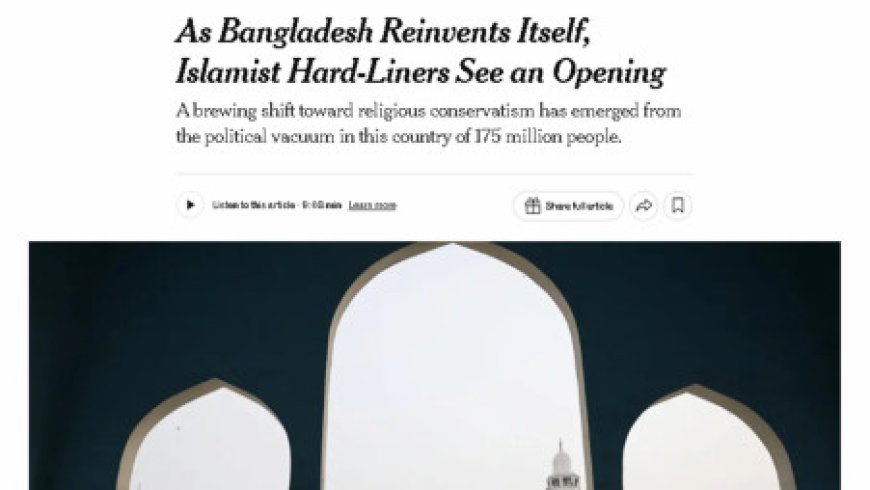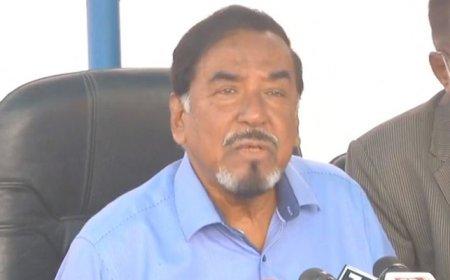NYT report claims Islamist hard-liners see an opportunity in Bangladesh; Government dismisses it as ‘misleading’
NYT report claims Islamist hard-liners see an opportunity in Bangladesh; Government dismisses it as ‘misleading’.

Bangladesh Government Refutes NYT Report on Rising Religious Extremism, Calls It ‘Misleading’
The Bangladesh government has strongly dismissed a recent New York Times (NYT) report that claims Islamist hard-liners are gaining influence in the country. The report, published on April 1, portrays Bangladesh as a nation at risk of being overtaken by religious extremism following political changes. However, the Chief Adviser’s Press Wing has rejected these claims, calling the article “misleading” and an unfair depiction of the country's political and social landscape.
NYT’s Report on Rising Religious Extremism
The NYT article, titled "As Bangladesh Reinvents Itself, Islamist Hard-Liners See an Opening," begins with the claim that religious extremists are asserting control over women's rights. It highlights:
-
An incident where religious hard-liners in one town prohibited young women from playing soccer.
-
A case where police were forced to release a man who harassed a woman for not covering her hair in public, after which he was publicly celebrated.
-
A rally in Dhaka where protesters called for the death penalty for those who disrespect Islam, with threats of vigilante justice if the government did not comply.
-
An outlawed Islamist group allegedly holding a large march demanding an Islamic caliphate in Bangladesh.
-
Concerns that a new Constitution under drafting may shift the country’s foundation from secularism to a more religious framework.
The article also suggests that Bangladesh’s female students, who were at the forefront of political protests, are now feeling vulnerable due to the rise of conservative forces. Critics in the report accuse interim government leader and Nobel laureate Muhammad Yunus of being too lenient towards extremists and failing to push back against their influence.
Additionally, the article draws comparisons between Bangladesh and other countries in the region, citing Afghanistan’s extreme religious governance, Pakistan’s history of Islamist violence, and India’s growing Hindu nationalism.
Bangladesh Government’s Response: ‘A One-Sided and Misleading Narrative’
The Chief Adviser’s Press Wing, in a statement posted on its verified Facebook page CA Press Wing Facts, dismissed the NYT article as misleading, stating:
“The New York Times article paints a troubling and one-sided view of Bangladesh, suggesting that the country is on the brink of being overtaken by religious extremism. This portrayal oversimplifies the political and social dynamics of the country and unfairly smears an entire nation of 180 million people.”
The government emphasized that the report fails to acknowledge Bangladesh’s progress in women’s rights, economic stability, and counterterrorism efforts. Officials stressed that while challenges exist, Bangladesh remains a diverse and resilient society with strong democratic values.
Key Points from the Government’s Response
1. Acknowledging Bangladesh’s Progress and Challenges
The government argues that while the NYT article focuses on a few isolated incidents, it ignores the larger picture of progress in Bangladesh:
-
The country has made substantial advances in women’s rights, education, and participation in public life.
-
The Interim Government has prioritized women’s security and empowerment, contradicting the article’s claims of a worsening situation.
-
As an example, the government cited the "Youth Festival 2025," where nearly 2.7 million girls from various regions participated in sports and cultural events.
-
The isolated cancellation of one soccer match does not reflect the broader reality, where thousands of other events proceeded without issue.
The statement also defended Chief Adviser Muhammad Yunus, highlighting his long-standing commitment to women’s empowerment:
-
As the founder of Grameen Bank, Yunus has championed economic independence for women, a vision that earned him the Nobel Peace Prize.
-
His administration remains dedicated to democracy, pluralism, and protecting freedoms despite the complex political climate.
2. Correcting Misconceptions About Religious Violence
The government emphasized that political unrest should not be confused with religious extremism. Many recent clashes, it argued, were politically motivated rather than based on religious sectarianism:
-
Religious and political groups often overlap, making it misleading to frame political disputes as purely religious conflicts.
-
The Interim Government has reinforced protections for minority communities and taken active steps to curb extremism.
-
Bangladesh has a strong record in counterterrorism and continues to collaborate with international partners on deradicalization efforts.
The government warned that misrepresenting political protests as religious extremism could distort Bangladesh’s reality and harm its global reputation.
3. Bangladesh’s Economic and Global Standing
The NYT article overlooked Bangladesh’s rapid economic progress and growing role on the global stage, according to the press wing:
-
Despite recent political changes, Bangladesh’s economy remains stable, with exports growing by 12% in the last seven months.
-
The banking sector and local currency have held steady despite political transitions.
-
Foreign investment is on the rise, with Bangladesh securing $2.1 billion in loans and investments from China in the past week.
-
Dhaka is set to host the Investors Conference next week, welcoming over 2,300 participants from 50 countries, including executives from Meta, Uber, and Samsung.
The government asserted that such economic resilience contradicts the NYT’s portrayal of Bangladesh as a country in crisis.
4. Rejecting Oversimplifications and Negative Stereotyping
The government criticized the NYT article for relying on selective incidents to paint a negative picture of Bangladesh:
-
In a country of 180 million people, a few isolated events should not define the entire nation.
-
Bangladesh has a strong tradition of secularism, art, and intellectual debate, which continues to resist extremism.
-
Religious hard-liners exist in many countries, but Bangladesh has taken active steps to counteract extremist elements while upholding democracy.
Officials reaffirmed that Bangladesh’s youth, women, and civil society remain committed to an inclusive and democratic future.
Conclusion: A Call for Fair and Balanced Reporting
The Bangladesh government strongly rejected the New York Times article, arguing that it presents an oversimplified, negative, and misleading view of the country. Officials emphasized:
-
Bangladesh remains committed to democracy, women’s empowerment, and religious tolerance.
-
Political unrest should not be conflated with religious extremism.
-
The country’s economic progress and global partnerships indicate a bright future, contrary to the NYT’s narrative.
The government called on international media to provide balanced and fair reporting on Bangladesh’s evolving political landscape.
While challenges remain, Bangladesh’s history of resilience, its commitment to secularism, and its focus on economic growth are key indicators of a stable and progressive future.
What's Your Reaction?





















































































